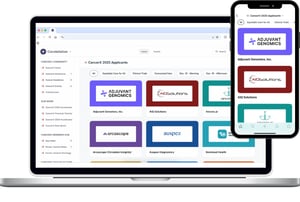
Closing the Efficacy-Effectiveness Gap: Digital Approaches to Optimizing Treatment Duration
The gap between clinical trial efficacy and real-world effectiveness often stems from suboptimal treatment persistence. A recent study indicated that approximately 19.5% of patients with stomach cancer, 30.8% with renal cancer, and 49.1% with liver cancer discontinued their oral anti-cancer medications, reflecting a range of discontinuation rates across different cancer types. This represents both a patient care problem and a significant market challenge for innovative therapies.
Treatment discontinuation creates a critical gap between potential and realized therapeutic benefit. This gap affects not only patient outcomes but also product performance metrics that sales teams are accountable for, including refill rates, days on therapy, and lifetime patient value.
Participants at a CancerX Executive Roundtable emphasized that adherence isn't simply a matter of patient compliance but rather "a complex interplay of side effect management, knowledge, support, and practical considerations." The most significant discontinuation drivers include inadequately managed side effects and financial toxicity.
Our experience working with pharmaceutical companies reveals that the most effective retention strategies don't focus on single interventions but rather address multiple discontinuation drivers simultaneously. Digital approaches offer practical solutions for each key discontinuation driver.
Proactive side effect management platforms provide structured monitoring with algorithmic intervention recommendations. By identifying and addressing symptoms before they become severe, these tools can reduce therapy discontinuation due to adverse events. This approach recognizes that many patients stop treatment not because of treatment failure but because of inadequately managed tolerability issues.
One pharmaceutical company we advised took this concept further by creating a comprehensive retention program around their therapy for metastatic breast cancer. They recognized that adherence challenges differed across the patient journey—early discontinuation typically stemmed from side effect management issues, while later challenges often involved financial concerns or uncertainty about continued benefit. Their digital platform adapted its focus based on where each patient was in their journey, providing precisely the right support at the right time.
Remote patient monitoring (RPM) platforms are revolutionizing cancer care through sophisticated digital monitoring capabilities. A comprehensive review of digital health interventions for cancer patients demonstrated that interventions allowing real-time monitoring and self-management of symptoms were linked to notable decreases in therapy discontinuation rates.
For commercial sales professionals, these digital retention approaches create compelling opportunities to extend average treatment duration, with even modest improvements in persistence significantly impacting both patient outcomes and commercial metrics. These tools enable sales teams to address persistence proactively by discussing concrete solutions for known challenges rather than merely highlighting the importance of adherence. Most importantly, comprehensive digital support offerings can create meaningful differentiation in competitive therapeutic areas where multiple treatments offer similar efficacy profiles.
What if you could identify patients at high risk for discontinuation before they miss a dose? How would your sales strategy change if you could offer a comprehensive digital solution for the top three reasons patients discontinue your therapy? What if your team could demonstrate to providers that patients on your therapy with digital support stay on treatment significantly longer than those without?
Digital approaches that address multiple dimensions of adherence simultaneously show substantially greater impact than single-focus interventions. By focusing on structured monitoring with algorithmic intervention recommendations, sales teams can help providers address issues before they lead to discontinuation. This approach transforms the traditional "remind patients to take their medicine or come in for treatment" conversation into a sophisticated retention strategy that addresses the complex factors that influence treatment persistence.
Our 'Precision Oncology' white paper reveals how digital approaches addressing side effect management and financial toxicity can reduce discontinuation rates by up to 37%. If you haven’t already, access it today for actionable retention strategies- then let’s chat!
SCHEDULE A MEETING WITH THE AUTHOR
Sarah Boone is a strategic advisor who bridges pharma innovation with US healthcare systems to accelerate digital health adoption and market success.
.png?width=125&height=125&name=logo_wt%20(3).png)






.png?width=300&name=CancerX%20Decimal%20Banner%20(2).png)